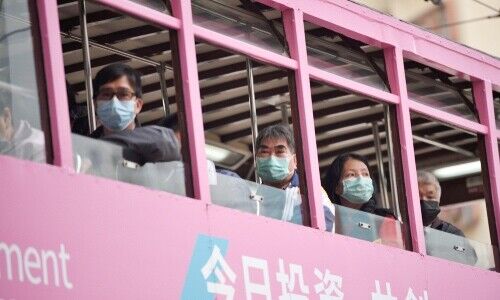Hong Kong’s Lee Hints Mask Mandate Drop
In wide-ranging comments to the media, the chief executive unintentionally highlights how the city is changing in its attempt to return to full normality.
If you didn’t know, yes, in Hong Kong, we still have them, carry them – and wear them. Everywhere. Surgical face masks.
That relic of what is an increasingly distant memory of the pandemic in so many countries around the world. It is also one of the last significant, tangible Covid-19 measures in place here.
And today, Tuesday, Hong Kong’s chief executive John Lee dropped another hint that they may soon go as well.
Winter Surge
In comments made to the media before an Executive Council meeting on Tuesday, the city’s de facto cabinet, he was asked when the mask mandate will be eased:
«I have said it many times that after the winter surge, I will be seriously considering what to do about the masking requirement,» he answered.
Well, as in much of Continental Europe, the unusually mild weather is making it feel like winter in Hong Kong is very much over – the difference here being that shorts and sandals are replacing jeans, trousers, and shoes on the city’s streets. The only reasonable assumption then, is that the surge portion of his rationalization remains relevant.
Sooner Than Later
Lee did add that he would be listening to the city’s secretary of health and medical experts. But if the latter is anything to go by, as finews.asia reported in late January, the sooner they are lifted, the better. In any case, it may be an entirely moot question, given the penchant for many in Japan, South Korea, and Singapore to keep wearing them anyway.
What was also interesting is that the questions unintentionally showed how the character of the city is likely to change as it returns to full normality.
Another, for example, related to the step in November easing the five-day notice requirement for US diplomats when meeting Hong Kong government officials and public educational representatives, originally introduced during a period when US-China geopolitical tensions were increasing.
US Sanctions
Now, as with other countries, they simply must provide notice. But in answering, Lee did not indicate whether he had met with any US representatives since then, although that would seem unlikely, as he faces American sanctions himself.
He did not answer the question directly at all, saying instead that any activities by consular staff needed to be conducted in agreement with the Vienna Convention on Consular Relations.
After that, he discussed the recent decline in property prices, with a journalist asking whether the inclusion of natural security clauses in land sale documents was eroding investor confidence.
Not Relevant
At the behest of China, the national security law was introduced in the middle of 2020 after months of extensive city-wide pro-democratic protests in 2019 although Lee indicated that this did not appear to be at all relevant for the market and investors.
But all this only goes to show the delicate balance the city is constantly trying to achieve. Whether it likes it or not, it is essentially at the whim of the world’s last remaining two superpowers.
Either the US or China lurks in the background of every issue up for discussion.
No Business Yet
There is also a larger context to all this. Hong Kong’s role as a financial hub is changing into something else entirely right before our very eyes.
Although it is not clear yet what that will look like, it is probably going to be both less western, and less attuned to western interests - not least given the city has not adopted any sanctions related to Ukraine and as many government officials have been sanctioned by the Americans themselves.
Apart from a few investment bank's equity trading departments, that is also likely to mean far less finance friendly, at least in the way that most expatriates have come to understand it.
No New Business
Evidence of that is last week’s trip by a business delegation and government representatives to the Mideast to try and drum up new business.
As part of that, they signed a memorandum of understanding with Tadawul Group, Saudi Arabia’s stock exchange operator, that may eventually enable cross-listings. As Bloomberg then indicated, the city is trying to convince oil giant Aramco to make a dual primary listing in Hong Kong.
This all follows prolonged attempts by China to pay for Middle Eastern oil in renminbi, rather than dollars, a discussion that is being closely followed by many financial hub players.
Oil for Renminbi
A trading and investment market expert specializing in China said that no one in the Middle East has ever responded with a yes when it came to selling oil in renminbi. The specialist indicated that, by itself, was significant, particularly after the last visit to the Mideast by Chinese President Xi Jinping in December.
But what is also clear is that Hong Kong, after the pandemic, remains the only viable window to the outside world for China, particularly after the long lockdowns in Shanghai and Shenzhen.
Although there has been a great deal of debate surrounding the city’s role as a financial center, it is now more important to China than ever.




























